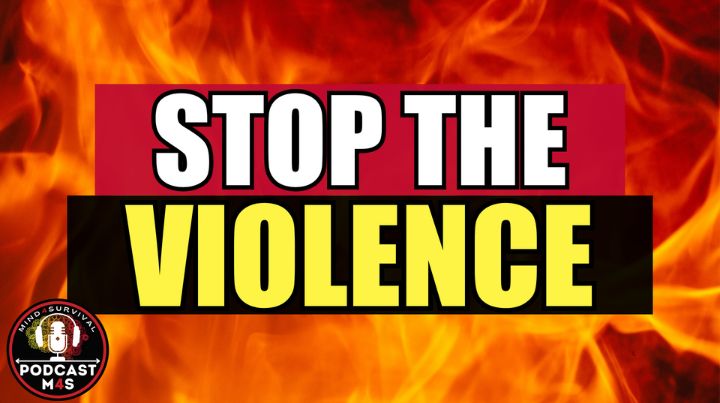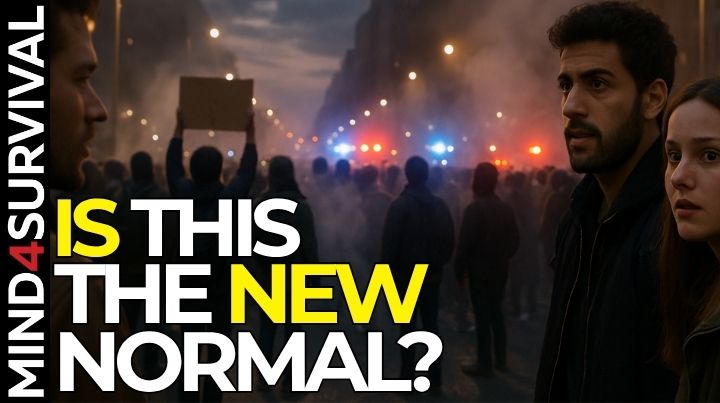How to Reduce Violence: A Holistic Approach

In the prepping world, we're all too familiar with the need to be ready for anything. But, while we are prepared by stockpiling goods and honing our survival skills, a broader challenge often goes unaddressed: the escalating violence in our societies.
While we have little influence on the political decisions that lead to increased violence, we need to find a way to do more to help protect ourselves, our loved ones, and our self-defined communities. It's high time we looked at this issue holistically, understanding that reducing violence is not just about law enforcement or self-defense. It's about thinking outside the box to build more resilient, supportive, and fundamentally safer communities for everyone.
Understanding Violence
To tackle violence, we first need to understand its roots. It's not just a symptom of individual hostility—it's often the product of deeper societal issues and failings like mental health struggles, social isolation, and environmental stressors. As preppers, we're no strangers to the importance of a well-rounded approach to safety, and the same principle applies here. Addressing the root causes of violence requires a more comprehensive approach.
The Prepper's Perspective
For us preppers, readiness goes beyond the tangible. Yes, our pantries are stocked, and our bug-out bags are packed, but we can't always be there for our loved ones. Our children and grandchildren go to school without us. Our spouses and partners go shopping and visit friends while we're elsewhere. How prepared are they, not just for a disaster, but a human-caused violence? The safety of our family, friends, and community is failing under the current paradigm and, as such, must be addressed whenever possible by the people most likely to encounter a violent person before they commit their violence.
Holistic Strategies for Violence Reduction
Community Engagement
The foundation of any secure community is its people. Strong, interconnected communities are less likely to fall prey to the cycles of violence. Engage with your neighbors, organize local meet-ups, and foster a sense of belonging. It's about creating a network where people look out for each other, where a problem for one is a problem for all.
Mental Health Awareness
Mental health is a critical piece of the puzzle. Recognizing and addressing mental health issues within our communities can prevent many instances of violence. We need to create environments where people feel safe to speak up and seek help, where mental health is not stigmatized but supported.
Education and Empathy
Empathy is our most potent weapon against violence. Understanding and caring for those around us can dissolve tensions and prevent conflicts. Organize community workshops on effective communication and conflict resolution. Show that every member of the community is valued and understood. If you see someone who appears to be struggling, engage with them safely and compassionately. One simple act of kindness may be enough to help derail future problems.
Access to Resources
A community is only as strong as its most vulnerable members. Ensuring everyone has access to necessary resources, be it mental health services, food, or education, is crucial. After all, it may be the person the community shuns rather than helps out who may be the next active shooter in the mall, at a school, or a local restaurant. Will your family and friends be there when the person pops? As preppers, we can lead by example, sharing our resources and knowledge and helping those in need.
Early Detection and Intervention
Preventing violence starts with the youth. Engaging young people in positive community activities can steer them from harmful paths. Mentorship programs, recreational activities, and educational opportunities can provide the guidance and support they need to thrive. Gee them out from behind the first-person shooter video games and into nature or activities where they can gain confidence and personal strength.
Promoting Mental Wellness
A healthy community is a safe community. Regular wellness events, group activities, and open dialogues about mental health can foster a supportive environment. Encourage practices that promote mental wellness and make it a community-wide priority.
Case Studies
Numerous success stories of communities have turned the tide against violence through holistic approaches. These case studies are blueprints for what we can achieve in our neighborhoods. From community policing initiatives that build trust between residents and law enforcement to after-school programs that offer safe havens for youth, the evidence is clear: holistic strategies work.
The Bottom Line On How to Reduce Violence: A Holistic Approach
Reducing violence is no small feat, but with a holistic approach, it's within our reach. As preppers, we have unique skills and a mindset that can significantly contribute to the safety and well-being of our families, friends, and communities. By extending our readiness beyond the confines of our homes and into our neighborhoods, we can create a positive impact that results in improved safety and security for all.
What are your thoughts on how to reduce violence? Tell us in the comments below.
Additional Resources:
- How to Prepare for a Violent Future
- Active Shooter Response: What Should I Do?
- LAPD Ten Things to Reduce Violence
Stay safe,

Related Articles
FREE Guide
Read the Best Seller
Join Mind4Survival
Stay informed by joining the Mind4Survival! 100% Secure! 0% Spam!
Affiliate Disclosure...
Mind4Survival is a free, reader-supported information resource. If you make a purchase through our link, we may, at no cost to you, receive an affiliate commission.
Do You Want To Be Ready No Matter What?

Download our free 39-page guide with interactive, 7-Day Emergency Kit Checklist and take the first step toward real preparedness.
- Know exactly where to start.
- Save time and money.
- How-to build a complete Basic Emergency Kit.
- Level up your safety and security.
Join Mind4Survival
Stay informed by joining the Mind4Survival! 100% Secure! 0% Spam!





